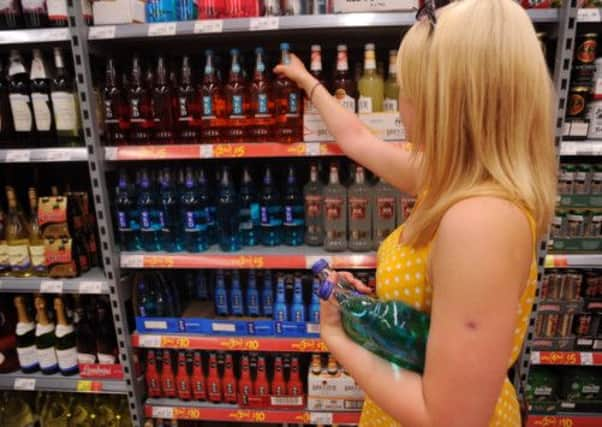SNP set for showdown over minimum pricing


Health secretary Alex Neil said yesterday he believed the attempt by ministers to tackle cheap drink sold in Scotland might well be decided at the European Court of Justice.
His comments came as the full scale of opposition emerged, with five wine-producing European nations – France, Spain, Italy, Portugal and Bulgaria – branding the plans “illegal, unfair and ineffective”.
Advertisement
Hide AdAdvertisement
Hide AdBut Mr Neil insisted he would fight on, saying the Scottish Government would win any court case “hands down”.
A law to allow a minimum price for all alcohol was passed by MSPs last year, with ministers saying it was required to help tackle the scourge of alcohol abuse.
However, the plans have been delayed by a legal challenge from whisky chiefs, who say minimum pricing will fail to tackle problem drinking, while costing the drinks trade hundreds of millions of pounds in lost income.
The Scottish Government won the first round of the legal challenge earlier this year, when the Court of Session ruled the plans did not break EU free trade laws.
That decision is now being appealed, but, whatever the outcome, it appears highly likely the matter will proceed to the Luxembourg-based court.
Mr Neil said: “We are prepared to take this the full way, to go the full mile, because we believe as a social measure this will help deal with this huge Scottish problem and take the lead in Europe in tackling the problem.
“It’s the right thing to do. Therefore, our plan B is to stick with this till we win the day.
“If we end up in the European Court, which I think at the end of the day may well happen, we will win hands down.”
Advertisement
Hide AdAdvertisement
Hide AdLast week, the UK government said it would not be pursuing minimum pricing, as there was not enough “concrete evidence” it would reduce harmful drinking without penalising responsible drinkers.
Drinks industry chiefs have long argued the plan would fall foul of EU trade rules by distorting the drinks market. The fear among whisky industry chiefs in Scotland is that tariffs imposed on imported drink will be used as an excuse by other countries to slap higher tariffs on exports of Scotch whisky.
However, the SNP argues the step will attack the source of Scotland’s drink problem, by specifically raising the cost of cheaper drinks, and ministers are confident they can persuade the courts of its legality, on the grounds the plan is “proportional” to Scotland’s particular health problems.
The challenge facing the Scottish Government was put into stark perspective yesterday, as details of the five EU nations’ objections were published.
They come in addition to concerns already expressed by the European Commission itself.
Portugal claimed minimum pricing would have “a dramatic impact” on its export market to the UK, “causing grave consequences to Portuguese companies and the sector in general”.
France said the move would create a “distortion of competition”, Bulgaria said it would “create many obstacles to trade”, while Spain said it “cannot be justified on the grounds of public interest”. Italy said fixing a minimum price “would be inequitable and discriminatory”.
Scottish Government officials said that, as a consequence, they expected the issue to be appealed all the way to the European Court of Justice. Such an action could be triggered by the European Commission once a domestic court action is concluded. Sources said that it could be at least a year before there was any clarity on the matter.
Advertisement
Hide AdAdvertisement
Hide AdA Scotch Whisky Association spokeswoman said evidence was now lining up against the Scottish Government.
“The opposition of five European wine-producing nations to minimum unit pricing [MUP] of alcohol, along with the European Commission’s concerns, fully supports the view we have consistently expressed that the policy would be illegal, ineffective and set a dangerous precedent which would impact our trading with overseas nations.
“It would damage overseas producers which rely on importing to Scotland and the UK. The Scottish Court of Session failed to give any consideration to the effect of MUP on producers in other European Union member states.”
She added: “We will continue to oppose MUP through the courts. The Scottish Government should concentrate on legal measures targeting the parts of the population drinking at hazardous and harmful levels. Measures already introduced seem to be working, as alcohol-related deaths and harms are falling in Scotland.”
Scottish Conservative health spokesman Jackson Carlaw said: “What we need now is fewer assertions from the Scottish Government that everything will be all right and this will simply sail through the courts.
“Instead, we require hard evidence of support from within Europe and proof that the Scottish Government’s legal case is sound.”
Mr Neil pointed to the Scottish court ruling as evidence of support for the policy. “The Court of Session, in the dispute between the Scottish Government and the Scotch Whisky Association, resoundingly ruled in our favour. It’s perfectly legal within European rules to introduce minimum unit pricing.”
He went on: “The problem drink is cheap booze, cheap vodka, cheap cider … and that’s where the impact of minimum unit pricing will be. It won’t be on deluxe whisky or a good wine from France.”
Advertisement
Hide AdAdvertisement
Hide AdBut Mario Moniz Barreto, secretary general of the Portuguese Spirits Association, told the BBC: “There is no demonstration that this measure will have an effect on the people it is trying to protect.
“We live in a free trade market area – the measure applied in one country is bound to have an effect on all the others”
If it is introduced, ministers have indicated that the price per unit of alcohol in Scotland would be set at 50p, meaning a bottle of wine with an alcoholic strength of 12.5 per cent would cost at least £4.69.
However, recent figures suggest alcohol consumption in Scotland is actually falling, following a ban on multi-buy promotions 18 months ago.